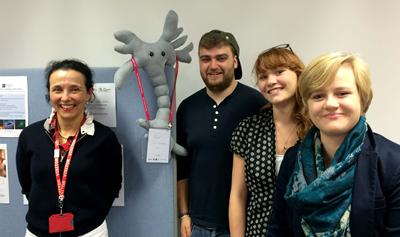Molecular mechanisms underlying learning and memory during the ageing process

The University of Southampton Neuroscience Group (SoNG) and the Institute for Life Sciences were delighted to host Dr Sonia Corrêa from the University of Bradford on the 29th October.
Why does it become more difficult to learn routine tasks as the brain ages or experiences neurodegeneration? Dr Corrêa discussed her research on the molecular mechanisms behind learning and memory in her seminar, “The MK2/3 cascade regulates AMPAR trafficking and cognitive flexibility”. The MK2/3 pathways may provide novel therapeutic targets to treat cognitive deficits associated with dementia and ageing.
In a ‘Meet the Expert’ session ahead of the seminar, students took the opportunity to discuss research questions with Dr Corrêa. Centre for Biological Sciences MSc student Stephanie Powell commented, “Meeting Sonia was a great experience which allowed us to ask her questions on any topic we desired. She was very enthusiastic and happy to talk about how she made it into her field as well as giving advice on our next steps. It was a great opportunity to talk to someone in neuroscience whose route into her role was not one that would be considered traditional. Opportunities like this are hugely beneficial providing challenging scientific discussion, unique careers advice and links with academics from various institutions. I would definitely attend another session similar to it.”
We are grateful to both the Physiological Society and Alzheimer’s Research UK, who sponsored Dr Corrêa’s visit to Southampton and the seminar. The Institute for Life Sciences is pleased to welcome Dr Corrêa as an Affiliate Member, which will help promote future collaboration between Dr Corrêa’s lab and Southampton scientists.
To find out more about Dr Corrêa’s research, see her recent Nature Communications article (Eales et al. 2014, Nat. Commun., 5:4701 doi:1038/ncomms5701).